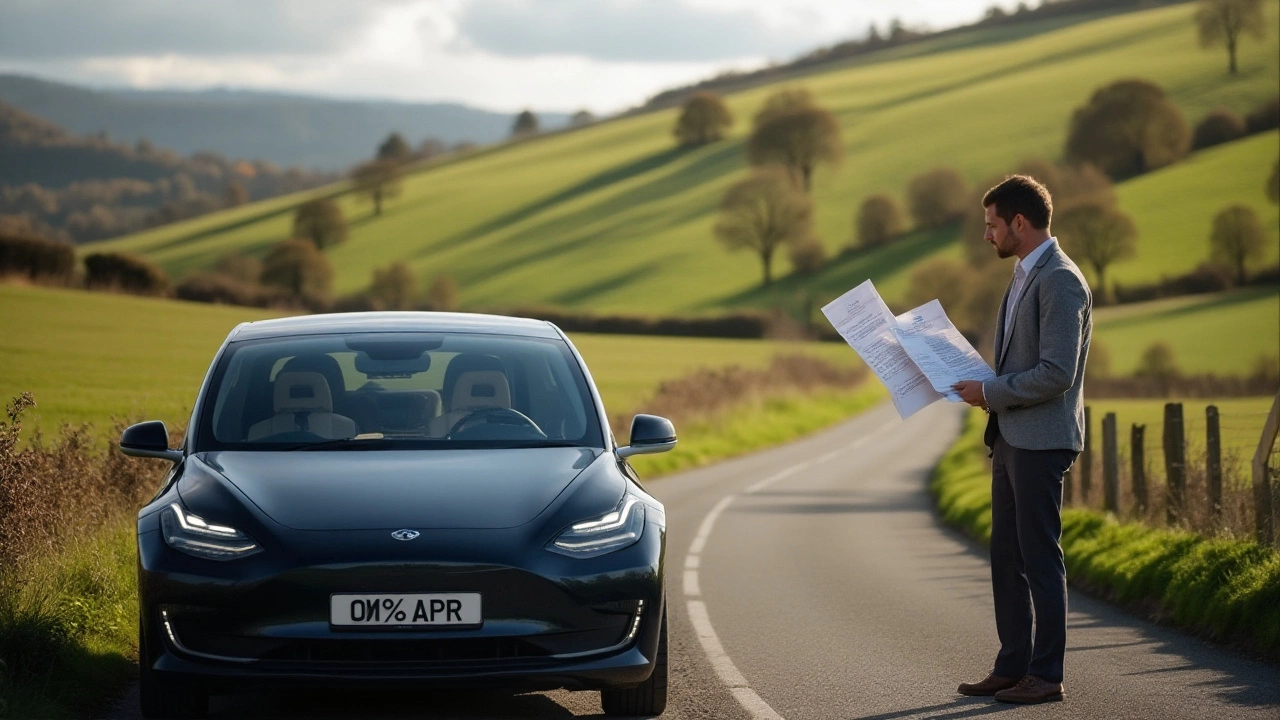When you're shopping for a car, the prospect of 0% APR financing can be incredibly tempting. After all, the idea of not paying interest on your loan seems like a no-brainer. But is it truly as good a deal as it sounds? And what does it exactly entail?
0% APR is often used as a promotional tool by dealerships to entice buyers. It’s a strategy that promises no interest on the borrowed amount, effectively making your loan 'interest-free'. But these deals are not always straightforward. They come with their own set of conditions and qualifications that not everyone can meet.
This article dives deep into understanding what 0% APR really means, explores the potential hidden costs, discusses who might qualify for such offers, and provides tips to help you make the most informed decision. It's about grasping the fine line between a deal that suits your budget and one that stretches it.
- What is 0% APR?
- The Hidden Costs Behind Interest-Free Deals
- Who Qualifies for 0% APR Offers?
- Tips for Navigating Car Finance
What is 0% APR?
When embarking on the quest to purchase a car, you've likely stumbled across the enticing term 0% APR. But what does it truly mean in the context of car financing? At its core, 0% APR signifies an annual percentage rate that is devoid of any interest charges over the term of the loan. Typically, when you finance a car, you repay not only the principal amount but also an additional cost in the form of interest. This interest compensates the lender for the risk and the opportunity cost of lending you money. However, with a 0% APR deal, the borrower is only required to pay back the principal amount, supposedly making it seem like a golden opportunity.
Now, while this might sound like a straightforward no-interest scenario, the mechanics behind its implementation can often be clouded. First of all, it's pivotal to recognize that such offers are mostly promotional and time-limited. Dealerships or manufacturers might use these campaigns to boost sales during specific periods or to clear out last year’s models. Lured by the prospect of zero interest, buyers are drawn in without considering the fine print. Contrary to common belief, only a select group of buyers with outstanding credit scores usually qualify for these offers. A major reason for restricting this offer is the risk assessment on the part of the lender, who believes that only those with excellent credit histories can reliably pay back their loans without default.
"These interest-free promotions are typically the domain of auto manufacturers' financing arms," notes Michael Herzing, an industry expert. He adds, "They aren't available everywhere and often entail strict credit requirements."Indeed, 0% APR is marketed by dealerships with an underlying anticipation that the buyer might opt for added services or a more expensive car model, ultimately offsetting what the dealership might lose in interest. Additionally, there is a possibility that buyers might miss out on cash-back offers, which can sometimes be more financially rewarding than a zero interest rate. Hence, it is crucial for buyers to thoroughly calculate and compare the advantages and drawbacks of such offers before signing on the dotted line. In essence, understanding what’s under the hood of 0% APRs can save potential buyers from paying unforeseen costs down the road.

The Hidden Costs Behind Interest-Free Deals
Everyone gets drawn to 0% APR offers in the realm of car financing, and it's no surprise given how appealing no-interest loans sound. However, it's crucial to unravel this offer to understand it isn't always synonymous with a perfect deal. These enticing promotions often come with strings attached, hiding their true nature underneath conditions only the most meticulous buyers spot. One primary aspect to note is that eligibility for 0% APR is often tied to having an excellent credit history. This criteria alone limits the pool of potential beneficiaries, leaving those with less stellar credit either ineligible or facing alternative financing with less attractive rates.
Diving deeper, you might also encounter a shorter loan term as a part of the 0% APR deal. While these offers appear generous, they often come with the requirement to pay off the vehicle within a condensed period, such as 24 to 36 months. While this means you build equity in your car more quickly, the catch is a significantly higher monthly payment compared to traditional financing options spread over five or six years. This increase can pinch your budget if you're not financially prepared for such a commitment, and often, folks don't calculate this when dazzled by the promise of interest-free purchases.
"Understanding the logistics behind zero-percent offers is key to ensuring they align with your financial goals," advises Kelly Blue Book, a trusted source in automotive research.
Then there's the case of special promotions or dealership offers. Sometimes, dealerships run concurrent cash-back promotions, which, when opted for, might exclude you from qualifying for the 0% APR. So, in choosing what looks like a cost-free loan, you might miss out on other financial advantages that could save you actual cash. This forces potential buyers to weigh the immediate appeal of zero interest against the actual monetary value of upfront capital reductions.
Another layer to be aware of is that not all cars in a dealership qualify for this promotion. Often, these sales tactics are restricted to certain makes and models, typically those that the dealership wants to clear out quickly, like less popular vehicles or older inventory. It's a strategic move—the offer is to help move cars otherwise likely to stick around longer. Therefore, the choice of vehicles available under a 0% APR financing offer may not include the latest models or the ones most in demand.
Adding to the potential hurdles are dealer-installed options and features. On the face of it, these can seem like great additions, offering enhanced performance or aesthetics. But often, they're quite lucrative for the dealership and packed into the final purchase price alongside your financing deal—ultimately increasing the cost of the car. The trade-off can translate to paying more than intended, even with zero interest, leaving buyers sometimes questioning their decision.
For those truly considering a 0% APR, it's vital to sit down with a calculator and a clear mind. Crunching numbers beyond the base appeal of immediate savings could surprise you. Comparing the potential higher monthly payments against traditional loans over a longer period—even with interest—can sometimes favor the latter, especially if the extra cash flow flexibility is crucial to your financial health. Don't let the allure of short-term gains blind you to potential long-term fiscal responsibilities.

Who Qualifies for 0% APR Offers?
0% APR car financing is often revered as the holy grail of auto loans, because who doesn’t love the idea of paying absolutely no interest? Yet, dealerships are not simply giving away these offers to every customer who walks through the door. A 0% APR deal comes with its own set of stringent qualifications. Generally, these offers are reserved for buyers with impeccable credit scores. We're talking about scores in the region of 700 and above, sometimes even requiring a near-perfect score upwards of 720.
Car manufacturers and dealerships set these standards because they need a cushion of assurance that the borrower can indeed pay back the loan amount without a hitch. Imagine loaning someone several thousand dollars on trust – you'd want to be sure, right? Typically, lenders use these enticing offers to attract customers who are considered financially reliable and low-risk. A study by Experian Automotive suggests that 61% of those awarded 0% APR were from the super-prime credit category, showcasing how selective this process truly is.
"Obtaining a 0% APR offer is a sign that an individual is financially disciplined and trustworthy enough to pay back their debt on time," says Greg McBride, CFA, Chief Financial Analyst at Bankrate.
Another criterion often slipped into these deals is the term limit. Don't expect to spread your payments over an unusually long period like you might with a conventional loan. These offers commonly cover shorter periods, often between 36 and 60 months. While the shorter term means you’ll own your car outright sooner, it also means heftier monthly payments, which users need to prepare for financially.
A final piece of this high-stakes puzzle is the type of car you’re buying. 0% APR is usually reserved for new models in the inventory that dealers want to move quickly. Don't count on finding these offers for older models or those that are already popular enough to sell without the need for additional incentives. Thus, while these offers sound alluring, they often serve as a marketing hook to move inventory or promote newer car models.

Tips for Navigating Car Finance
Navigating the world of car finance can be a daunting task, especially with enticing offers like 0% APR dangling in front of you. To make the best decision, it's crucial to arm yourself with knowledge and a set of strategies. First and foremost, scrutinizing the terms and conditions of any financing offer is essential. Often, those eye-catching zero-percent deals are limited to specific models or might require a huge down payment. Additionally, they can necessitate an excellent credit score, which not all borrowers will qualify for. Understanding these prerequisites will help you determine if this path is viable for you or if traditional financing would serve you better.
Another tip is to consider the total cost of ownership when buying a car. This includes insurance, maintenance, taxes, and other expenses, not just the monthly payment that fits comfortably in your budget. While 0% APR can seem like a breeze, ensure there are no higher premiums lurking in other costs. Performing meticulous calculations can save you from financial surprises down the line and help keep the overall cost in check. Also, reaching out to multiple lenders might give you leverage; comparing different offers can uncover better deals elsewhere.
The interest rate is a significant factor, yet it's just one piece of the puzzle. You need to look at the length and structure of payment schedules too. A lower rate with extended months might mean paying more in the long term. Balancing paying off the debt quickly and manageable monthly installments is key. Seeking professional advice can be a wise choice if you're feeling a bit lost. Financial advisors or even trusted friends can provide valuable insight on whether a specific deal clicks with your personal situation.
"Understanding the nuances of different financing options is crucial," says auto finance expert, Jane Donovan. "It's not just about the advertised rate; buyers must look at the broader picture, including hidden fees and personal affordability."
Setting a firm budget and sticking to it is another golden rule. It would be best if you didn't let the allure of a new car sway you from financial responsibility. Always shop around and never hesitate to negotiate terms. Dealers are sometimes willing to adjust terms to meet a sale, especially if the end of a sales period is near. Keep your needs and limits forefront, and don't let emotions drive your decisions.
A little-known fact that's beneficial is to check if the car borrower can pay off the loan early without penalties. Some contracts have pre-requisite conditions against early payments, which can trap you in a longer-term arrangement. Calling in and talking directly with the institution offering the loan can remove ambiguity and help you know your options better. Whether you're considering auto loans or leaning towards more traditional purchasing methods, making informed choices is the best protection against financial setbacks.
